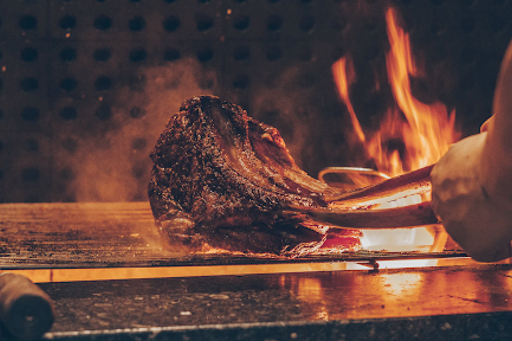
World Carnivore Month: Should You Bite Into the Hype?
Ready to ditch the veggies, chuck the carbs, and embrace a more primal feast? As January roars in with World Carnivore Month, many people are eager to start the year with a commitment to only eat meat and eggs. But is this really sustainable?
This meaty debate is no doubt filling your social media feeds. As a more extreme version of a low-carb or ketogenic diet, carnivore touts even greater mental and physical health benefits.
So, let’s tear into the science behind the hype to ensure your inner caveman knows how to optimize this diet for success in the modern world.
What is World Carnivore Month, Anyway?
World Carnivore Month was started by Dr. Shawn Baker, MD, a surgeon, author, athlete, and carnivore advocate, as a counterpoint to the Veganuary trend (January’s vegan challenge).
Though not an official, globally recognized event on standard calendars, this grassroots movement amongst carnivore diet enthusiasts occurs throughout January. The goal? To raise awareness about this meat-and-eggs-only lifestyle, promote its potential health benefits, and address any misconceptions or concerns people might have.
While some participants go carnivore for the entire month, others use it as an opportunity to learn more about the diet, experiment with different meats and recipes, and share their experiences with others. It’s like a celebratory reset for the new year after enjoying all those holiday meals.
Fuel Up for Victory: 5 Carnivore Diet Benefits
The carnivore diet eliminates all plant foods in favor of animal protein. No carbs, veggies, fruits, nuts, or seeds — just a protein paradise where beef, poultry, pork, game meat, bone broth, organ meat, and eggs satiate your appetite. So why bite into this trend?
In the landmark Harvard Carnivore Diet Study, researchers surveyed over 2,000 carnivore dieters to discover why they started such a restrictive diet and what happened as a result.[*] More than 93% chose carnivore for its potential health benefits, such as:
- Body weight/body composition improvements (84%)
- Higher focus/energy (74%)
- Allergy and autoimmunity perks (56%)
- Better digestive health (52%)
- Enhanced physical performance (46%)
- Mental health wins (45%)
So, how did they fare? Over 95% reported better overall health on a carnivore diet and up to 91% said their well-being improved. When researchers jumped into specifics, they discovered that the benefits of being a protein-fueled machine included:
1. Improved or Resolved Diabetes and Insulin Resistance
Several studies and clinical trials have shown that low-carb diets are effective for lowering high blood sugar and even reversing type 2 diabetes.[*]
So it’s no wonder that 98% of participants in the Harvard Carnivore study with type 2 diabetes improved or resolved their diabetes and insulin resistance. Nearly 85% were able to discontinue their oral medications, and 92% discontinued insulin.[*]
2. Fat-Burning and Weight Loss
The carnivore diet has the potential to spark your body into fat-torching overdrive, potentially turning you into a metabolic furnace.
According to survey responses, 93% of carnivore dieters stopped being overweight or obese. More than 90% of survey takers reported lower hunger/food cravings, and 81% of carnivores only ate one or two meals a day. People lost an average of 20 pounds, and mean BMIs decreased from 27.2 to 24.3.[*]
3. Higher Energy and Mental Mastery
A body running on glucose goes through sugar highs and sugar crashes, leading to grumpy afternoon slumps and hazy brain fog. But thanks to the steady stream of protein and fat keeping their engines humming, 89% of carnivores reported more sustained energy throughout the day. When it came to their cognitive prowess, going carnivore helped:[*]
- 85% elevate their mental clarity
- 83% enhance their focus
- 66% boost their memory
Plus, getting off sugar and living on protein and fat seems to slay stress, anxiety, and depression. A staggering 96% of carnivores said their mental health was much better.
4. Digestive Clarity
Is your digestion feeling more sluggish sloth than sprinting cheetah? Many carnivores start this diet to clear out their digestive system and start fresh. Similar to an elimination diet, carnivore removes triggers of GI distress, such as:
- Lectins found in grains and legumes
- Sugar, artificial sweeteners, and sugar alcohols
- Indigestible fibers and fillers in prepackaged foods
- FODMAPs (short-chain carbs found in certain fruits, veggies, etc., that are poorly absorbed by the small intestines)
Ditching these saboteurs may reduce inflammation in the gut, potentially alleviating certain GI symptoms like bloating, diarrhea, or constipation. It may be why 97% of carnivores in the Harvard study improved or resolved their GI conditions.[*]
5. Potential Relief for Autoimmune Conditions
The carnivore diet shares some similarities with the Autoimmune Protocol (AIP), an elimination diet used by some to manage autoimmune symptoms. Both banish potential food triggers like grains, legumes, and nightshades. Nearly 90% of carnivores in the Harvard study said they improved or resolved autoimmune conditions.[*]
These wins are undoubtedly noteworthy, even if the science to back them up is currently ongoing.
The Carnivore Diet Done Right
If you want to walk on the primal side, keep these three carnivore best practices in mind:
Always Choose High-Quality Food Sources
Favor the highest-quality food you can find. Grass-fed and finished beef, pasture-raised poultry and eggs, forest-foraged pork, wild-caught fish — these should be your nutritional trophies, not processed junk or mystery meat.
Supplement Smartly (If At All)
Skeptics say a carnivore diet lacks vitamins, antioxidants, and micronutrients humans need to perform their best and stay healthy. But science may bust this myth. For example:
Carnosine may be a potent antioxidant. Found exclusively in animal tissues, carnosine has been shown to scavenge reactive oxygen species (ROS) and reactive nitrogen species (RNS), suppress oxidative stress caused by free radicals, crush protein oxidation, and more.[*][*]
Evidence suggests that a carnosine-rich carnivore diet may protect your body from diabetes, cancer, neurodegeneration, and other age-related conditions.[*][*]
Organ meats are “nature’s multivitamin.” The nutrient density of organ meats is astounding. You’ll score more than adequate amounts of B vitamins, vitamin A, vitamin C, choline, iron, selenium, and more. That’s probably why 42% of carnivores in the Harvard study consumed organ meats weekly or more.[*]
🫀 Organ meat too spicy for you? Meet our Bell’s Brownie Batter Keto Brick. Produced as a collab with Mark Bell and his popular Steak Shake protein, it contains a beef organ blend with kidney, liver, heart, pancreas, and spleen but tastes like a fudgy brownie!
Don’t Forget About Fat If You Want To Stay In Ketosis
Though both carnivore and keto are low-carb diets, you could say their protein and fat macros are somewhat flipped:
- Carnivore daily calories: 50-75% from protein, 20-50% from fat.
Excessive protein intake (beyond your body’s immediate needs) can trigger gluconeogenesis, where your body converts amino acids from protein into glucose.[*] If your fat intake is too low on carnivore, gluconeogenesis may help your body meet its energy demands, tanking ketone levels and potentially knocking you out of ketosis.
So, eat more healthy fats to nudge your body into prioritizing ketone production over glucose generation.
Take a “Meat and Bricks” Approach with Keto Bricks
We recommend a “Meat and Bricks” approach to thrive on a carnivore diet and stay in ketosis. Eat your normal carnivore feast, plus a Keto Brick. You’ll score ample calories and the best type of dietary fat (stearic acid).
Keto Bricks are performance bars made by performers for performers. They boast perfect keto macros and contain only the cleanest ingredients — raw, organic cacao butter, grass-fed and pastured whey protein, pure MCT oil powder, pink Himalayan salt, and more.
We keep the junk out to streamline meal prep and macro tracking. Use them as a meal replacement or snack, or portion them to eat alongside your carnivore feasts for added fat and protein.
🍖 Let’s Start World Carnivore Month Strong!
Carnivore isn’t for everyone — but we’re guessing the same can be said about a lot of the dietary and lifestyle choices you make. Carnivore takes dedication, planning, and a willingness to embrace the primal side of the plate.
So, if you’re up for the challenge, grab a few flavors now to ease into your new Meat and Bricks adventure!
Leave a comment
Comments will be approved before showing up.
